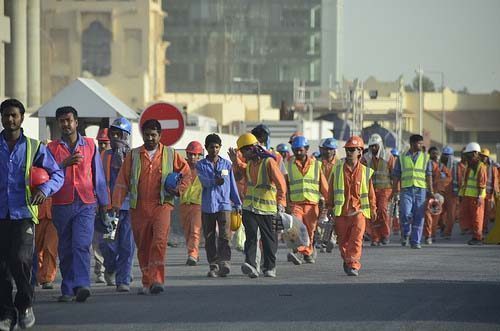
International advocacy group Human Rights Watch has launched a landmark 145-page investigation into the labor conditions of migrant workers in Qatar, highlighting issues of abuse and exploitation, often in direct violation of law.
The report, entitled “Building a Better World Cup: Protecting Migrant Workers in Qatar Ahead of FIFA 2022,” aims to shine a spotlight on the labor issue here as it becomes more urgent amidst massive infrastructure developments for the upcoming global sporting event.
Says Human Rights Watch (HRW):
“The deeply problematic working conditions of migrant workers throughout the country mean that realizing Qatar’s World Cup vision may depend on their abuse and exploitation unless adequate measures are taken to address the human rights problems widespread in the construction industry in Qatar.”
The organization interviewed more than 70 migrant construction workers in Qatar, as well as employers, government officials, and diplomats from major labor-sending countries.
According to its report, workers routinely suffer poor conditions and low wages, making as little as $6.75 a day for 9-11 hours of work. Labor camps the organization visited also crammed between 8-18 workers into a single room, and offered no drinkable water on site, in direct violation of Qatar’s laws.
HRW’s photo gallery: Poor living conditions for Qatar’s workers. Photos by Sam Tarling
Despite the awful situation, most aren’t able to leave the exploitative situation due to:
- Exorbitant recruitment fees, paid for with high-interest loans
- The restrictive kafala (sponsorship) system that prevents workers from changing jobs or leaving the country without a sponsor’s permission
Qatar’s Ministry of Labor says it is “inconceivable” that there are instances of forced labor in the country, given that workers have a legal right to break contract. HRW responds:
Conditions of forced labor are not obviated by the right of a worker to break his contract and return home. When workers owe onerous recruiting fees, are not free to find new employers, and do not have custody of their passports, they are, in fact, very likely to be in conditions of forced labor, as defined by international law.
Although some labor rights are guaranteed under Qatari law, the report identifies significant flaws both in the monitoring mechanisms in place to ensure standards, as well as opportunities for redress on the part of abused workers.
For example, Qatar employs some 150 labor inspectors, but they don’t speak the common languages of workers, and never interview them in the course of inspections. And while the ministry maintains a labor complaints hotline, complaints can only be received in Arabic and English.
Workers who do manage to lodge formal complaints have succeeded. But the process can be lengthy, and workers must support themselves as they lose their jobs, salary and housing once the complaint is lodge.
It isn’t the first time these issues have been brought to light. A year ago, the International Trade Union Confederation (ITUC) released its report and documentary about labor abuses here, and Qatar’s own National Human Rights Commission has done the same, calling for changes to the sponsorship system.
As yet, few tangible reforms have been made. But David Segall, HRW’s Middle East and North Africa Coordinator, says Qatari authorities have assured them they are taking the findings “very seriously.”
Read Human Rights Watch’s report in full (sans photo feature):
Credit: Top photo by Karen Blumberg
What are your thoughts on the report?








